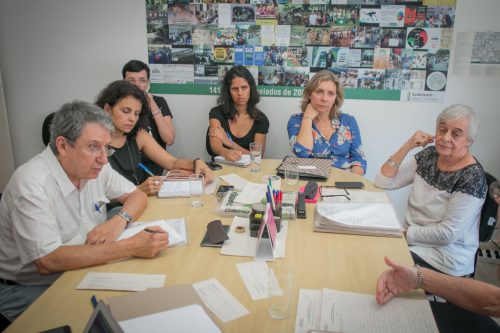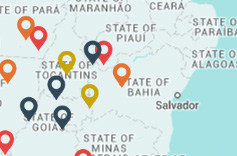
SAO PAULO, SP, BRASIL, 24-04-2015 – COMITÊ DE SELEÇÃO DO EDITAL DE TRÁFICO DE PESSOAS – (Foto: Ronny Santos)
Following a selection process that began at the end of last year, the Brazil Human Rights Fund has approved nine projects through its “Confronting human trafficking” round of funding. The foundation will donate a total of R$ 360,000 to combat human trafficking, representing an amount of R$ 40,000 per project.
The new line of support is aimed at groups that combat trafficking connected to slave labor and sexual exploitation of women, children and adolescents.
The selection process included the participation of a Selection Committee made up of three specialists in the area: Fábio Balestro Floriano, from the Friedrich-Ebert-Stiftung Foundation, Maria Madalena Ferreira Guilhon Macieira de Barros, from Fundo Elas; and Maia Sprandel, an anthropologist who works in the Federal Senate.
“I don’t believe it’s important for the entity to have already developed action on human trafficking. Often, given the force of the anti-trafficking agenda, it may even be interesting that it doesn’t”, Maia remarked on her own selection criteria. “I prefer to legitimize entities that have already realized projects consolidating and strengthening groups and communities, since the results in and of themselves already strengthen (the entities)”, she added.
Fábio emphasized projects involving direct action to confront human trafficking, the presence of a multiplicator effect and detailed budgets. Meanwhile Madalena divided her report into stronger and weaker points, always taking organization communications into consideration.
The geographic diversity, the type of organization and the target population and the mode of trafficking were criteria followed by all Selection Committee members.
The Brazil Fund received a total of 111 entries in response to the call for proposals.
Results – Human Trafficking Call for Proposals
See the 9 projects selected through the specific funding round, “Confronting human trafficking”.
Minas Gerais Prostitutes Association — Aprosmig
Prostitutes, rights and migration
With a methodology that prioritizes training in pairs, the prostitutes will discuss the difference between migration aimed at sexual labor and exploitative human trafficking. Content on the subject will also be produced and shared, including information on national and international support networks dealing with the subject. The association looks to also strengthen the struggle for rights for professionals in the category.
House of the Woman Worker — Camtra (Rio de Janeiro)
Mischief out. My body and my dreams are my responsibility! No to the sexual exploitation of girls and women
The Brazil Fund’s support will enable the continuation of the campaign, begun in 2014, that reached 9,800 people through the sharing of information on the internet and another 3,100 who received materials on the topic of sexual exploitation. The proposal is now to expand this reach, with special focus on content that deals with forms of solicitation and methods of confronting them.
Migrant Support Center and Pastoral (São Paulo)
New life with dignity and respect for immigrants
The pastoral’s focus is to disseminate knowledge about rights to immigrants and their families, especially in terms of dignified, decent labor. The proposal is to combat slave labor and human trafficking, increasing assistance to immigrants in the city of São Paulo, removing them from vulnerability through the acquiring of official documentation.
Carmen Bascarán Center of Defense of Life and Human Rights — CDVDH/CB (Maranhão)
Community meetings to combat human trafficking
The project intends to hold training activities with community leaders in the towns of Açailândia and Santa Luzia, including nearby settlements; as well as mobilization events to spread the word among the general population about the problem of human trafficking.
Integral Center of Reference on Adolescents — Cria (Bahia)
The city raises children — citizenship scenarios to confront human trafficking
Cria’s proposal is to involve children, adolescents, youth and professionals working with the system to guarantee the rights of this population, residents of around 20 communities in Salvador and two other cities in the state of Bahia — Marcionílio de Souza and Andaraí — in training activities on the topic of human trafficking employing an art-educational methodology. Among the expected activities are the production and presentation of a dramatic play; debates in the school community; participation of educators at meetings held by state committees against human trafficking; and public mobilizations on dates of significance to the issue.
Humanitarian Center of Support for Women — Chame (Bahia)
Traveling with my rights
Promoting the confrontation of human trafficking through a gender-based and human rights perspective. Holding training activities with multiplicators; elaboration and publication of a folder with information related to prevention of abuse in migratory processes and a guide for those spreading the information on how to make sharing it possible.
Guaribas Group for Freedom of Sexual Orientation — GGLOS LGBT (Piauí)
Human trafficking: a challenge to be overcome
The group looks to confront human trafficking through the diffusion of information on the subject in schools and among leaders who are directly involved with the LGBT population. Talks in 22 municipalities throughout the greater Picos region are planned, as well as a final seminar.
Urban Mobility Pastoral — PMH / Santa Cruz Archdiocese of Corumbá (Mato Grosso do Sul)
Legal migration: migrating is a right, trafficking is a crime
The pastoral will help to welcome migrants, offering them information on mobility conditions in Brazil; and in combating prejudice and the criminalization practiced by Brazilian public services against this population. The goal is to avoid Bolivian, Haitian and Bengalese immigrants, among others, being recruited into slave labor in Brazil — which occurs especially in the textile industry (São Paulo), foodstuffs industry (southern states) and, in the case of women, also for sexual exploitation.
Union of Indigenous Women of the Brazilian Amazon — Umiab (Amazonas)
Indigenous workers with liberty, dignity, rights and citizenship
The project’s focus is combating the trafficking of indigenous women from their lands to Manaus, Tabatinga and São Gabriel da Cachoeira for exploitation as domestic workers; and of families exploited in the centers of extactivist production, Barcelos and Santa Isabel do Rio Negro. Among the activities planned are research and training sessions on the topic for indigenous leaders.







